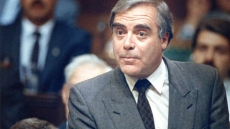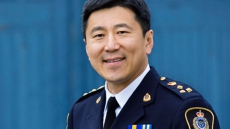A concessionary proposal by British Columbia's striking teachers on Friday pledging to start the school year if the province agreed to binding arbitration was swept aside by government, which firmly told the union to return to bargaining with something affordable.
Education Minister Peter Fassbender responded negatively to the B.C. Teachers' Federation's suggestion that both sides relinquish control of contract decisions, meaning the ongoing strike appears likely to drag into its second week of the fall term.
"I do not relish giving over our responsibility to a third party to make the decision," Fassbender told reporters in Victoria.
"I challenge the BCTF again to work with us ... and to be willing to make the hard decisions and take that forward to their membership."
Union president Jim Iker announced the offer earlier in the day over a live-streamed news conference, watched by a myriad of teachers breaking from four days of picketing to discuss the labour action that went full-tilt last spring.
He pitched the arbitration even while acknowledging government officials had previously shot the option down.
"I'm hoping government will change its mind on this, because it's the fastest way to resolve this," Iker told reporters. "We'll recommend it to our members and we can be back to work."
It's the first time the union has proposed such a settlement method in its decades of combative history with B.C. governments of all stripes.

Had the union executive received an affirmative response, it would have immediately called a vote among striking teachers that could have reopened schools for half-a-million students sometime next week.
Binding arbitration would involve the two sides mutually agreeing on a person who would hammer out contract details that everyone would be compelled to accept.
Iker said the union was prepared to relinquish control of several demands, including decisions around compensation, benefits and preparation time, although he stipulated there were some pre-conditions about how to handle the most contentious issues.
The government would have to agree to separately negotiate a fund that would add new money to school budgets for addressing class size and composition, in a process apart from the main collective agreement, he said.
The government must also drop clause "E80," a provision dealing with class size, and learning and working conditions. A connecting clause states that if either side is unsatisfied with the outcome of a pending court case they could terminate the collective agreement.
The teachers' federation has twice won decisions from the B.C. Supreme Court stating the government illegally removed the union's rights to bargain classroom limits and ratios back in 2002, when now Premier Christy Clark was education minister. An appeal of the most recent court decision will be heard starting October.
Fassbender did not "categorically" reject arbitration, but said the province had previously had a bad experience with that option, referring to a costly dispute with B.C. doctors more than a decade ago.

In 2002, the B.C. Liberals hiked the Provincial Sales Tax to pay for hundreds of millions of dollars awarded to the doctors by an arbitrator.
"This government will not raise taxes in order to provide a settlement to one union that does not reflect what the other public sector (workers) have done," Fassbender said.
Union officials admitted their proposal could risk removing pressures around class size and composition issues, but said the tactic seeks to hold Clark to comments made earlier this week.
On Wednesday, the premier began calling classroom composition "the single most important issue."
The union has proposed a fund of $225 million in new money to hire additional teachers and specialists. The government has said its current $75 million annual fund is sufficient.





